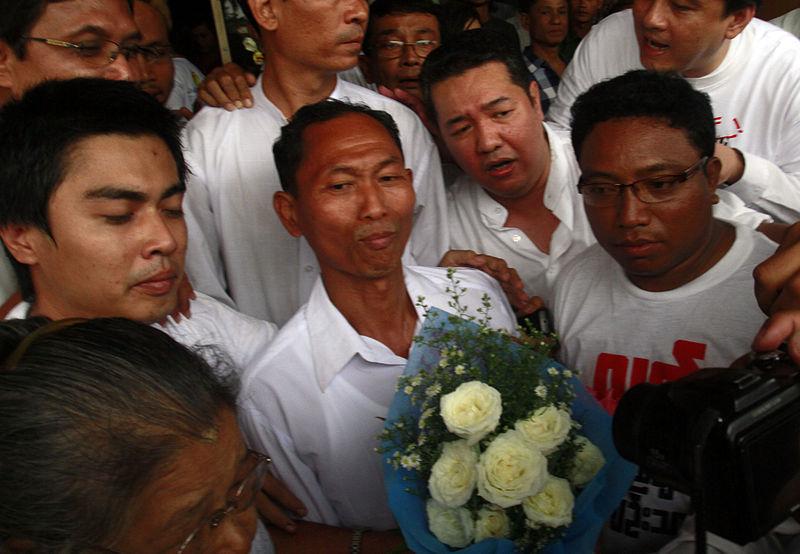ASIACALLING
Civil society in the shadow of Myanmar’s military
"After one of her closest legal advisors was assassinated at Yangon Airport just over a week ago, Su Kyi is again, completely silent."

On the surface it seemed like a big win for Myanmar, the appointment of Aung San Su Kyi as head of state after decades of military junta rule. But that milestone is increasingly ringing hollow.
Su Kyi has continued to attract criticism for failing to speak out against alleged abuses of the Rohingya ethnic minority committed by the military. And now, after one of her closest legal advisors was assassinated at Yangon Airport just over a week ago, Su Kyi is again, completely silent.
From Sweden, Ric Wasserman has this story.
Nearly a thousand mourned the death of Ko Ni, Aung San Su Kyi’s legal advisor and a member of her National League for Democracy Party, or the NLD.
Ko Ni, an outspoken Muslim lawyer in a largely Buddhist country, didn’t shy away from criticizing the powerful role the military continues to hold in Myanmar.
The 65-year-old was also an expert on constitutional law and involved in tying to amend the military drafted constitution.
Here at this panel on human rights in Myanmar, otherwise known as Burma, Ko Ni’s assassination was the talk of the day.
A close advisor to Aung San Su Kyi, observers have been perplexed as to her reaction, or lack thereof, at Ni’s death.
Here’s Kristian Stokke, a conflict analyst and sociology professor from the University of Oslo.
“Regardless who is behind it, this is clearly a major setback for the reform process in Burma. I would think that being such a central person and legal advisor on constitutional affairs, it’s surprising.”
Maybe, though, it’s not that surprising. Under the veil of a democratic reform process the military has actually been reversing gains that were made before Aung San Su Kyi became head of government.
The army controls most key infrastructure investment projects including dams, as well as gas, mining and electricity – and holds 25% of parliament seats.
Su Kyi has effectively been marginalized, says Liz Tydeman, from the Swedish NGO, Burma Committee.
“Unfortunately she has less power than the previous administration, which was appointed by the army. So this is the problem. We’ve begun criticizing the NLD government but we shouldn’t forget that the army is the perpetuator and they are permitting all the attacks. Unfortunately she’s not in a position to criticize. Or she’s not criticizing.”
It’s not only Aung San Su Kyi that has chosen self-censorship, says Liz Tydeman with a sigh.
“One of the dynamics with the NLD is that they don’t allow their MPs to speak to the media so we’re not hearing much from that party. Ethnic MPs’ do definitely tend to be more vocal,” explained Tydeman.
The media has opened up in Myanmar, but there are dangers. Running afoul of telecommunications law 6060 for “acts detrimental to the state, community peace, and tranquility,” can result in a 7 to 15 year jail sentence.
“We are seeing journalists being arrested and it’s particularly sensitive to criticize the army. It’s very difficult for media to do that,” said Tydeman.
There is much discussion now on how, and with whom to engage, to reduce the present state of internal conflict in the country.
Sweden has won a place as a non-permanent member of the United Nations’ security council. And there are high expectations for what they might do on Myanmar, says Swedish MP, Åsa Eriksson.
“As we can see we’re not doing enough because the situation is like it is. I think that the Swedish government has been very clear in our opinion to the regime in Myanmar and I also think we will bring up the subject in the security council,” said Eriksson.
Dr. Muang Zarni, a writer and activist from Myanmar, who now lives in the UK, also addressed the hearing.
He believes that trying to reform military generals is futile, and the international community has to change its approach.
“The generals do not look at development the way we do because public welfare is not what drives their policy or what motivates them to keep the country together. It is power,” claimed Zarni.
While the European Union has opted to work with the generals, and welcomed increased business investment, Sweden is instead working to strengthen Myanmar’s democratic institutions.
But that doesn’t give any solace to the family of Ko Ni, who say he was targeted because of his influence and close relationship with Aung San Su Kyi.
Human rights groups have called for a thorough and independent investigation into his assassination.
- Myanmar
- Mynamar military
- Ko Ni
- Aung San Su Kyi
- National League for Democracy Myanmar
- Muang Zarni
Komentar (0)
KBR percaya pembaca situs ini adalah orang-orang yang cerdas dan terpelajar. Karena itu mari kita gunakan kata-kata yang santun di dalam kolom komentar ini. Kalimat yang sopan, menjauhi prasangka SARA (suku, agama, ras dan antargolongan), pasti akan lebih didengar. Yuk, kita praktikkan!